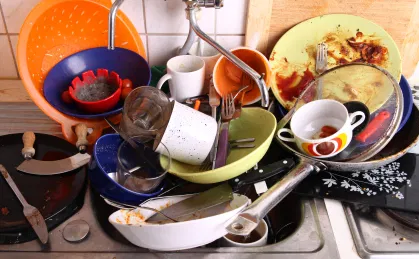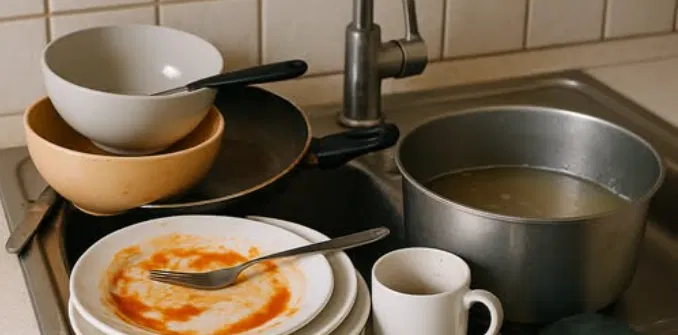“How Dirty Dishes Reveal Your Mental State: The Surprising Psychology Behind the Pile-Up”
The state of our home often mirrors the state of our mind. One of the most frequent household tasks—washing dishes—can tell us a lot about our psychological habits, emotional health, and even our coping mechanisms.
Ever noticed someone leaving dirty dishes in the sink and wondered why? Or perhaps you’ve found yourself doing it and questioned its impact on your life? Let’s dive into the psychology behind this behavior and explore why keeping those dirty dishes in check is more important than you might think.
The Hidden Psychological Significance of Dirty Dishes

Why We Leave Dirty Dishes Behind: Understanding the Psychological Factors
Leaving dishes unwashed often goes beyond mere laziness—it can be tied to a variety of psychological factors, including:
- Stress and Exhaustion For many, dirty dishes accumulate because they feel too physically or mentally drained to deal with them. A hectic day, overwhelming responsibilities, or high stress can make even small tasks seem like a major hurdle.
- Procrastination and Disorganization Procrastination doesn’t only show up in the office or classroom—it can sneak into our home life too. For some, washing dishes feels like a bothersome chore that’s easy to put off. This avoidance may be a sign of broader procrastination habits or a general tendency to delay tasks.
- Emotional State and Mental Health Piled-up dishes can be a reflection of deeper emotional struggles, like depression or anxiety. When someone is dealing with mental health challenges, household chores often feel insignificant, leading to clutter and disarray that mirrors their inner state.
- Lack of Structured Habits Leaving dishes unwashed can also stem from a lack of routine or organizational habits. People who haven’t established a structured approach to managing daily tasks might struggle to maintain order in their home environment, including dealing with dirty dishes.
Why You Shouldn’t Let Your Dishes Pile Up: The Benefits of Keeping Things Clean

Regardless of the reasons behind leaving dirty dishes, letting them stack up can have lasting negative effects on both your physical and mental health. Here are some key reasons to avoid letting those dishes pile up:
- Preventing the Growth of Bacteria and Odors
Leftover food on dishes is a perfect breeding ground for bacteria and can attract pests like flies and cockroaches. Additionally, the lingering smell of dirty dishes can permeate not just the kitchen, but the entire home, creating an unpleasant atmosphere. - Reducing Visual and Mental Stress
A cluttered space often leads to a cluttered mind. Seeing a sink full of dirty dishes can feel overwhelming and stressful, leaving you with a sense of guilt or frustration. Keeping your space tidy can reduce mental strain and improve overall mood and productivity. - Promoting Discipline and Self-Care
Washing dishes right after eating is more than just a chore—it’s a practice in discipline and self-care. By maintaining a clean kitchen, you’re building organizational habits that contribute to a sense of responsibility and well-being. - Enhancing Coexistence with Others
In shared living situations, the buildup of dirty dishes can lead to tension and conflict between housemates or family members. Regularly washing dishes helps create a more harmonious living environment, fostering better communication and shared responsibility.
Conclusion: The Power of Keeping Your Kitchen Clean
Washing dishes isn’t just about maintaining a tidy home—it’s a reflection of your overall discipline, mindset, and daily habits. While occasionally leaving dishes isn’t a major issue, consistently letting them pile up can have detrimental effects on your health, emotional well-being, and home dynamics.
By making an effort to stay on top of this simple task, you’ll experience numerous benefits, from a clearer mind and improved mood to greater control over your daily life. How do you manage dishes in your routine? Do you make a habit of washing them immediately, or do they sometimes pile up?